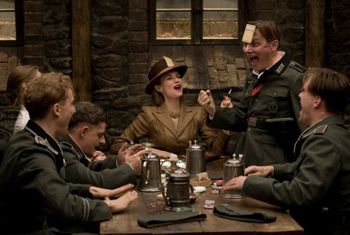Bad things happen in dark cellars...
I just caught up on two movies that had been sitting in my DVR, just begging to be watched. The first was Sam Raimi's Drag Me to Hell, and the second was Quentin Tarantino's Inglourious Basterds. While I was hoping to enjoy both movies, I had no idea that I'd be viewing perfectly complimentary works of art.
With Raimi's work, you know it's going to be campy horror -- more "startles" than actual scares and a fair share of Rube Goldberg-styled cartoonish violence in lieu of the current glut of torture and sadism. In contrast, with Tarantino, you know you're going to get long scenes of witty dialogue and philosophical debate, punctuated by bursts of horrific gore.
The two styles could not be more distinct, and yet, like two sides of the same coin, they somehow come to the same conclusion on morality.
In Drag Me to Hell, Christine Brown wants a promotion at her job. She is disgusted at the way her primary competitor for the position behaves in his attempts to curry favor with her boss, and refuses to stoop to his level. She's far too decent a person to sell her soul to the bank just for a few extra dollars in her paycheck... and believes her decency and hard work will win out...
However, when an old gypsy woman comes in begging for yet another extension on her delinquent mortgage, Christine asks her boss what she should do. He says it's up to her to decide, and she takes that to mean she needs to reject the old woman's request. For her efforts, the gypsy puts a curse on her that will ultimately end up with her being dragged to hell by demons.
Of course, the boss never actually said she had to reject the woman's request... Christine took it upon herself to make that call. Throughout the rest of the film, with her only goal now being to act in selfish self-preservation, she will agree to sacrifice animals, desecrate graves and even consider murdering completely innocent strangers, all in an effort to "atone" for her initial act of greed.
By the end of the film, Christine only admits her wrongdoing when she believes herself to be free of the curse and in possession of the promotion, and therefore no longer subject to any repercussions. She has transformed from an innocent farm girl into someone deserving of all that evil that came her way during the movie.
The message is clear: do the right thing and show compassion to others or else you'll get what's coming to you.
Now, let's look at Inglourious Basterds. This movie does not take place in everyday society, but rather in a time of war. The rules are different here... in order to survive, you cannot show compassion. Any act of kindness or concern for the welfare of others will result in death.
Shoshanna (Tarantino's innocent farm girl) only meets her tragic demise after she has a pang of remorse about shooting Fredrick. Bridget von Hammersmark's treachery is only brought to light because she had signed an autograph for an adoring fan at a time when she would have felt bad about being rude to him. The German soldiers who escape the clutches of the Basterds along the way? Those are the ones who betray their fellow countrymen's positions, trading their own lives for theirs. Those who show blind loyalty to "the cause" end up both dead, and with a gruesomely receding hairline to boot.
They say war is hell -- and living at a time and place where more often than not your only chance at survival is by killing before you get killed yourself is certainly not a place I ever want to find myself. I'd much rather live where respecting others and lending a helping hand is the preferred (and rewarded) course of action...
After watching these movies, on this, I think both Sam Raimi and Quentin Tarantino would agree.








No comments:
Post a Comment